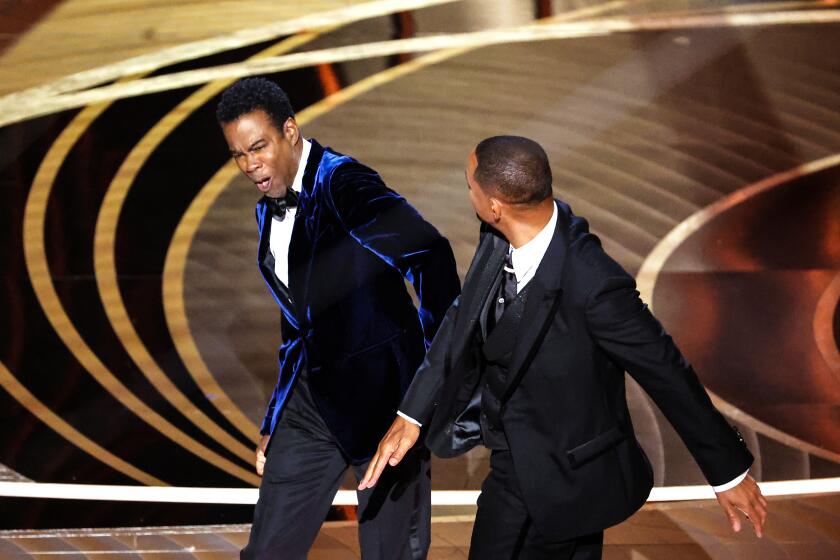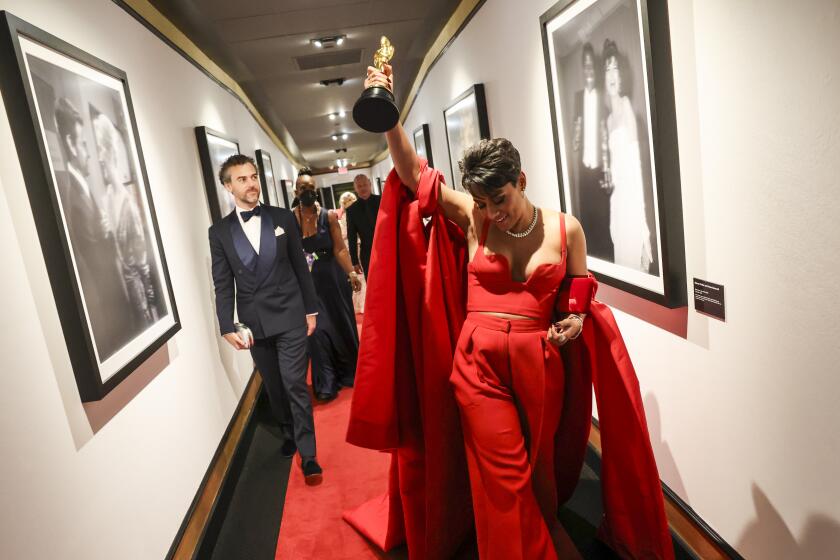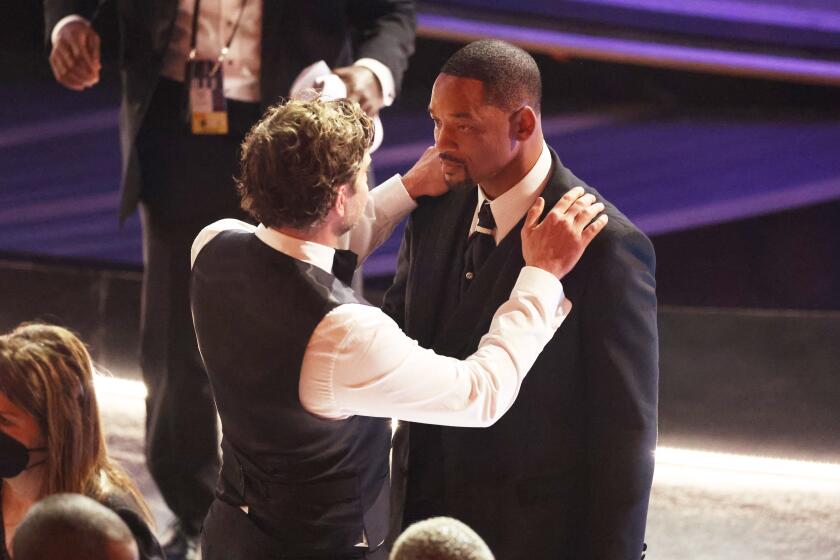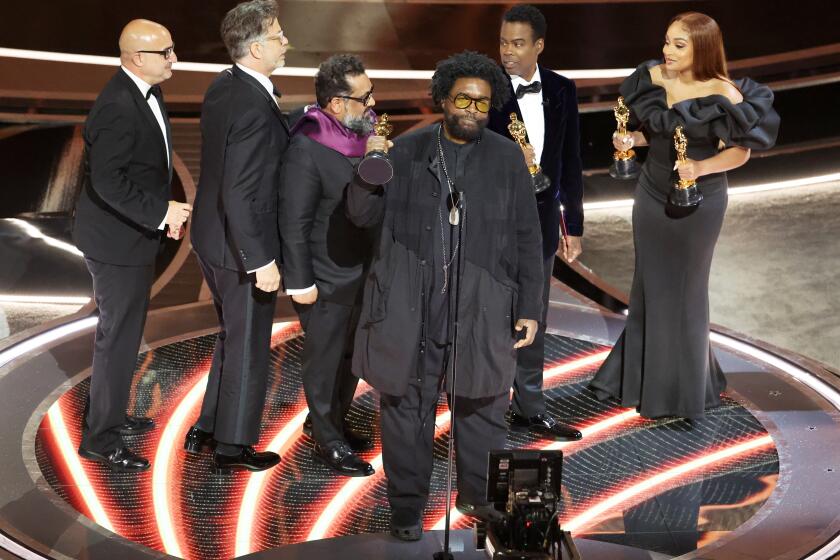How to handle Will Smith’s slap is just one of many crises facing academy after Oscars

- Share via
If it’s true — as Denzel Washington told Will Smith moments after Smith strode onstage at the 94th Oscars and slapped Chris Rock across the face — that the devil comes for you at your highest moment, then motion picture academy officials must be wondering what Satan does when you’ve hit rock bottom.
The academy hoped Sunday’s Oscars would be a morale-boosting celebration of movies for a troubled film industry. Instead, the show has done further damage to the already battered image of the nearly century-old organization and opened up a host of thorny new problems for its already divided leadership.
The academy’s board, which includes such Hollywood notables as Steven Spielberg, Ava DuVernay and Laura Dern, will be meeting Wednesday night to sift through the rubble.
Smith’s violent outburst engulfed the evening in controversy, overshadowing everything else, leading academy leaders to already call one emergency meeting the next day to review the incident amid members’ calls to discipline the actor, who won the Oscar for his lead work in “King Richard” shortly after striking Rock.
Everything we know about the infamous moment at the 2022 Oscars, from the history leading up to the onstage shocker to today’s latest developments.
The academy subsequently issued a statement Monday condemning Smith’s actions. “We have officially started a formal review around the incident and will explore further action and consequences in accordance with our Bylaws, Standards of Conduct and California law,” the group said. (Smith posted an apology on his Instagram account later that day.)
But it’s unclear what disciplinary action the organization may take against one of the industry’s biggest and most generally well-liked stars. On Monday, Whoopi Goldberg, an academy governor, said categorically on the daytime talk show “The View”: “We’re not going to take that Oscar from him.” Since adopting a code of conduct in 2017, the academy has ejected only three members: producer Harvey Weinstein, director Roman Polanski and comedian-author Bill Cosby.
Some have speculated that Smith’s membership could be suspended, but the decision is not likely to come soon. The organization plans to carefully follow the procedures laid out in its bylaws and standards of conduct. (In 2019, Polanski filed a lawsuit against the academy, alleging it had not followed its own protocols in expelling him, but ultimately lost the suit.)
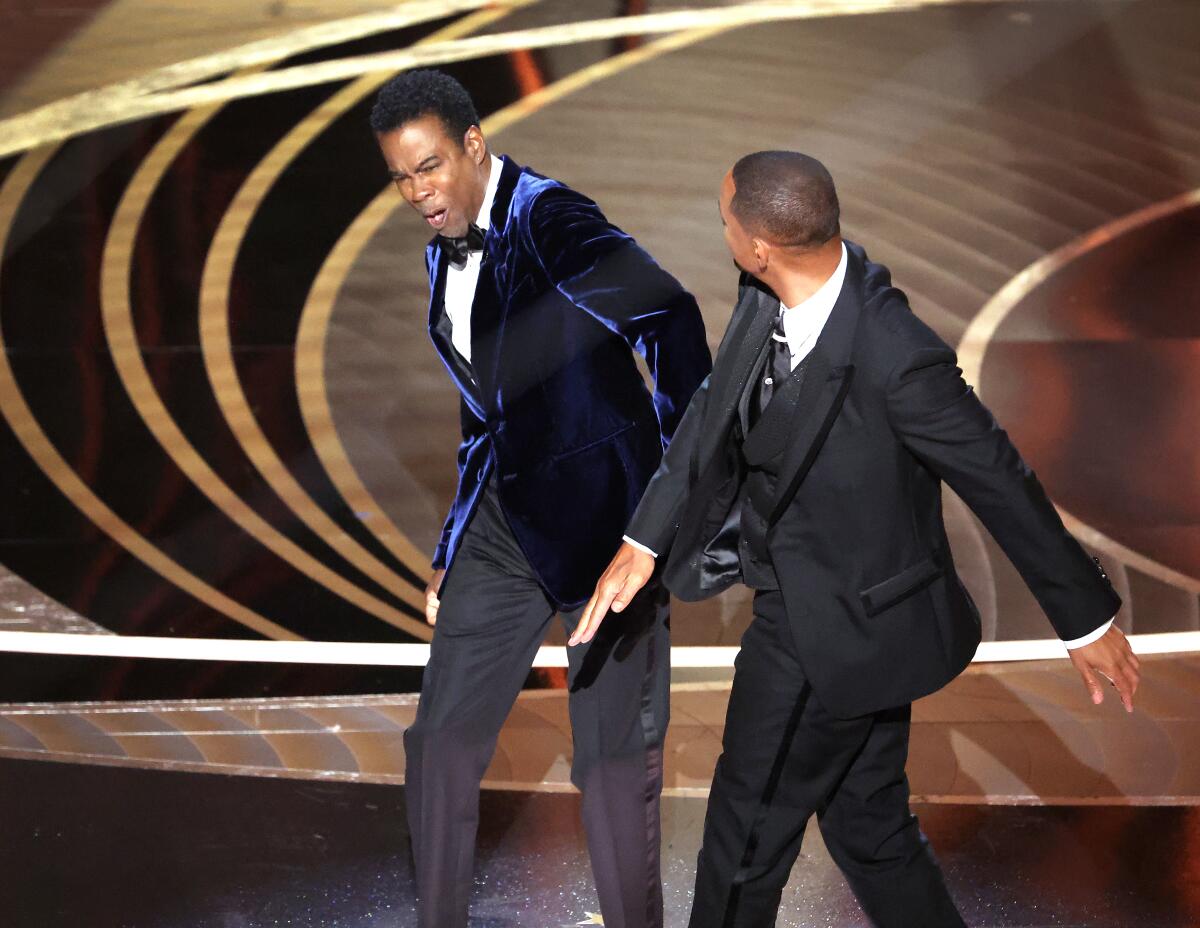
In a letter to members circulated Tuesday evening, academy president David Rubin and Chief Executive Dawn Hudson again condemned what Smith did and called it “unacceptable and harmful behavior.”
But they emphasized the board would follow the bylaws to determine “appropriate action” for Smith. “As governed by California law regarding members of nonprofit organizations like the Academy, and set forth in our Standards of Conduct, this must follow an official process that will take a few weeks,” Rubin and Hudson wrote.
“Please trust,” the letter concludes, “that the Board of Governors will conduct this process in a manner that is both expedient and respectful of all involved while maintaining the standards of the Academy.”
Even before Smith shocked the world, the academy’s decision to move eight categories off the live telecast — ostensibly to shave a few minutes from the often bloated show — produced outrage and hurt feelings among members. It also somehow resulted in the longest ceremony since 2018. In the wake of what many regarded as a debacle, academy members have not been shy about expressing their displeasure, and some have contemplated quitting the organization.
“After being a member for 30 years, I’m embarrassed to be associated with the Oscars telecast,” director Frank Oz wrote Monday on Twitter. “Not because of ‘The Slap’ but because of the phoniness of the show. All I sense is a desperate attempt to get more viewers by any means possible, not a show about the love of making movies.”
“There were a lot of nice things to remember about the evening … that I don’t think anyone is going to remember,” one of the academy’s 54 governors, who declined to be named due to the sensitivity of the subject, told The Times.
Three women hosted, Beyonce busted open the show and Jane Campion, Sian Heder and Ariana DeBose had historic wins. But then Will Smith hit Chris Rock.
Granted, the news wasn’t all bad for the academy. The telecast drew 15.4 million viewers in fast national ratings, and 16.6 million in the final tally, up nearly 60% from last year’s record low. Beyoncé’s pretaped performance of her Oscar-nominated song “Be Alive” from a Compton tennis court ranked as one of the great opening moments in the show’s history. And some of the winners — notably actors Troy Kotsur (“CODA”) and Ariana DeBose (“West Side Story”) — gave beautiful, heartfelt speeches that highlighted the organization’s continued strides toward greater inclusion.
But even with the ratings rebound, viewership for Sunday’s show was still the second-lowest in Oscar history. Just eight years ago, the Oscars telecast — from which the academy derives the bulk of its revenue — pulled in more than 40 million viewers.
The controversy and embarrassment come at a moment when the movies that the Oscars are meant to honor are struggling to attract audiences in theaters, as streaming platforms such as Netflix, Disney+, Apple TV+ and Amazon’s Prime Video continue to siphon viewers. With the best picture win for “CODA,” Apple — which paid a record-setting $25 million to acquire the movie at last year’s Sundance Film Festival — became the first streamer to claim the academy’s top prize, signaling a seismic shift in the industry’s power center away from the major studios and toward the disruptors that have upended their business models.
From the Oscars going back to Sundance, why ‘CODA’ was always something special.
The academy itself is at a crossroads, with a search to replace the outgoing Hudson in the works and Rubin terming out this year. In September, the organization finally opened the Academy Museum of Motion Pictures, fulfilling a long-held dream to create a beacon for movie lovers in Los Angeles. But the $480-million museum, which went significantly over its initial budget, has continued to cause debate within the academy over issues of representation, while attendance has been slowed by the COVID-19 pandemic.
The academy’s leadership had hoped this year’s Oscars ceremony, marked with the theme “Movie Lovers Unite,” would be a feel-good affair, reminding viewers, and perhaps members themselves, about the magic of cinema.
But the weeks leading up to the show were plagued with division after the organization, under pressure from ABC to boost ratings, announced its decision to move eight below-the-line and short-film awards off the live broadcast. Prominent filmmakers urged the academy to reconsider. In an open letter, 70 film professionals, including heavyweights such as James Cameron, Guillermo del Toro, John Williams and Kathleen Kennedy, warned that the move would do “irreparable damage” to the Oscars’ reputation.
In the end, the calls to walk back the decision were to no avail. On Sunday, those eight Oscars — the three short categories, plus film editing, original score, production design, sound and makeup and hairstyling — were briskly handed out in an untelevised ceremony, with the winners, and their edited speeches, incorporated into the telecast later.
“It did not feel like part of the show,” producer Bonni Cohen, a nominee for the documentary short “Lead Me Home,” told The Times midway through the telecast. “I understand that this awards show is the only money-making device the academy has, and they’re trying to figure out ways to make it watchable. But I don’t think this is the solution. None of the filmmakers are happy about this.”
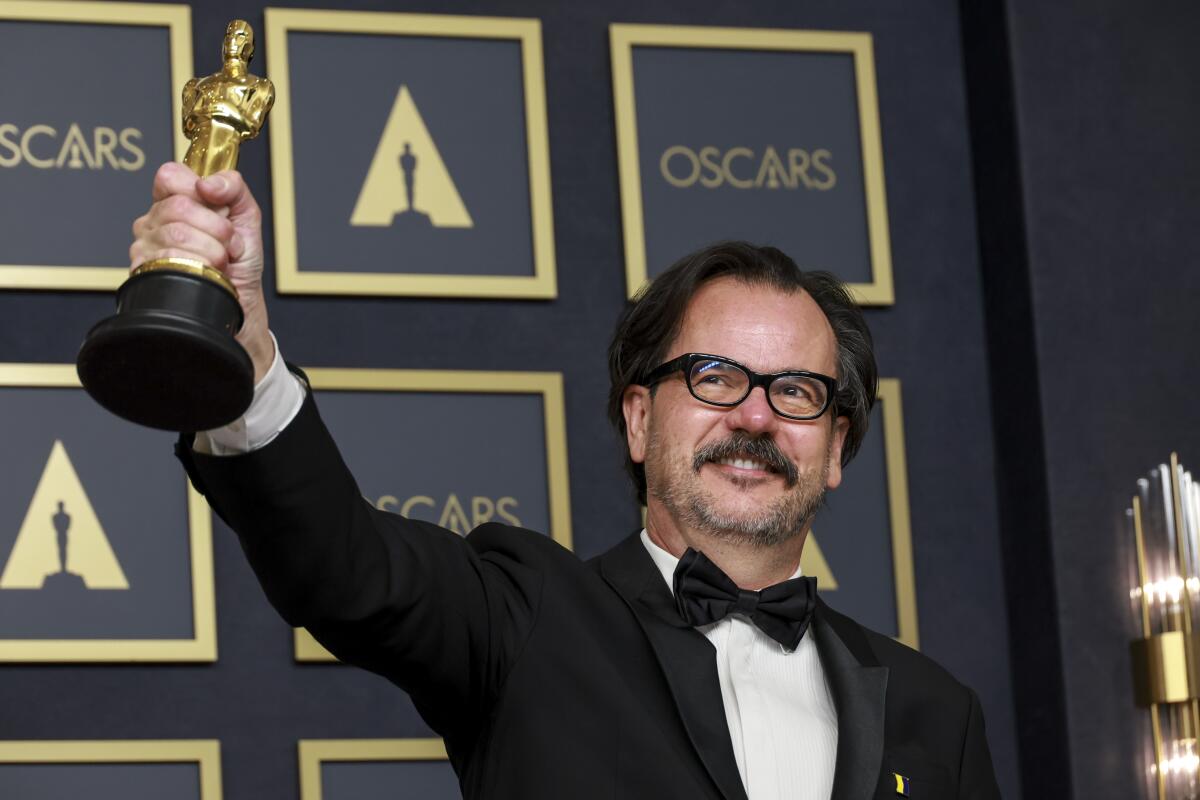
Academy leaders, ABC and the Screen Actors Guild react to Will Smith’s shocking encounter with Chris Rock on the Oscars stage Sunday night.
Added Joe Walker, winner of the film editing Oscar for “Dune,” in an email to The Times: “As the evening went on, and clearly things were over-running, I noticed that they were trimming the speeches harder and harder, so by the time they got to mine, only a short section was left. I’m not unhappy that my voice was truncated, if that had been everyone’s experience.”
Transcripts of the winners’ speeches are posted on the academy’s website, but even then, not in full — just the truncated form in which they were heard on the show.
An academy governor, who declined to be named due to the sensitivity of the subject, told The Times that moving the categories off the live broadcast would likely stick.
“This has been an ongoing issue for a long time, and, of course, it hurts,” the governor said. “But people watch television differently now. And the Oscars have to acknowledge that.”
Not every winner bemoaned the changes. Speaking with The Times after the awards, Linda Dowds, who won the makeup and hairstyling Oscar for “The Eyes of Tammy Faye,” was more conciliatory. “I just came into this with an open mind and an open heart, that was the most important thing,” said Dowds. “We still got to walk the red carpet. We still got to go back and make a speech. People saw us.”
Will Smith’s slap of Chris Rock was a stomach-churning moment at the 2022 Oscars, and robbed one of the night’s winners of his moment to shine.
That can also be said, technically, at least, about two of this year’s honorary Oscar winners, Samuel L. Jackson and Liv Ullmann, who, along with Elaine May and Danny Glover, received their trophies at the Governors Awards on Friday. The telecast devoted 25 seconds to the quartet, briefly showing Jackson and Ullmann in the audience.
“Just a travesty,” complained a member of the directors branch, who declined to be named due to the sensitivity of the subject. “But that was the vibe of the whole show. They spent more time belittling movies than they did celebrating them.”
In an effort to draw in more casual fans, this year’s Oscars included a first-ever fan-favorite award, voted on via Twitter, a gambit that drew widespread derision from academy members and cineastes alike in the run-up to the show. The ultimate winner — Zack Snyder’s gory Netflix zombie heist “Army of the Dead” — was no one’s idea of a movie that deserved special attention at the Oscars. (Snyder’s “Justice League,” was also voted as having the best “cheer moment,” further demonstrating little beyond the power of his online devotees.)
Adding insult to injury, members voiced concerns to The Times about the demeaning nature of some of the hosts’ comments toward the nominated films (Wanda Sykes joked that she had seen “The Power of the Dog” three times — and was halfway through it) and the way that actors Lily James, Halle Bailey and Naomi Scott introduced the feature animation category, reducing it primarily to a medium for children.
The Oscar race for animated feature puts a spotlight on the fresh perspectives of Phil Lord, Charise Castro Smith, Carlos López Estrada and Yvett Merino.
“Super cool to position animation as something that kids watch and adults have to endure,” tweeted Oscar-winning filmmaker Phil Lord (“Spider-Man: Into the Spider-Verse”).
Among academy leaders who have been buffeted by nearly nonstop controversy and uncomfortable scrutiny since the #OscarSoWhite firestorm erupted in 2015, a sort of siege mentality has taken hold.
Speaking with The Times in the wake of Sunday’s Oscars, one academy governor, who declined to speak on the record due to the sensitivity of the subject, expressed weariness at the apparently never-ending cycle of drama, in-fighting and controversy: “Just another year at the Oscars.”
Times staff writers Jessica Gelt and Amy Kaufman contributed to this story.
More to Read
Only good movies
Get the Indie Focus newsletter, Mark Olsen's weekly guide to the world of cinema.
You may occasionally receive promotional content from the Los Angeles Times.
